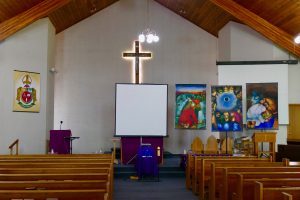Grateful for Everything
(Col 3:12-17; Ps 113; Mt 7:7-12)
********************************************
Years ago, a comment made by a monk I overheard passing by a television set caught my attention and stayed with me ever since: “A grateful person is a happy person.” That comment aligns closely with another statement that came my way: “If, at the end of our life, the only prayer we are able to say is the three words, ‘thank you, thank you, thank you,’ that would be enough.”
Appropriate words to being this reflection on Thanksgiving Day in Canada, based on the alternate readings offered for this first day of Week 27 Year B. The message is clear – let us count our blessings and be grateful.

The reading from Colossians is a very rich, gentle encouragement to be Christlike as well as grateful, in two interesting ways – clothing and action. First of all, the clothing: We are to clothe ourselves with compassion, kindness, humility, patience and above all, with love which binds everything together in perfect harmony.
Once clothed with these beautiful virtues, we are poised to swing into action: We are to bear with one another. When that becomes overbearing and we are hurt, we are to forgive others from the heart, as the Lord has forgiven us. That forgiveness will lead to peace and serenity only Jesus can give us reigning in our hearts.
We are then to ponder and contemplate the Word of Christ, letting it dwell richly in our minds and hearts, as well as share our wisdom and learning with others, teaching and admonishing one another.
The encouragement to contemplate the Word of God has led me to develop the ancient method of prayer known as Lectio Divina with its four traditional stages, into Audio-Visio-Lectio Divina with now seven stages including biblical art, a hymn or song, and a way of responding to that Word.

Lenten Mission In Nipawin, Sask.
Regarding teaching and admonishing one another, Richard Rohr taught me something years ago that has influenced me greatly – as soon as you learn something, don’t cling to it – give it away, teach it to someone else. That was during a talk on male spirituality. I took him seriously and that launched my involvement with the men’s movement continuing to this day.
Finally, we are to be thankful, and live lives of praise, singing psalms, hymns and spiritual songs to God with gratitude in our hearts, and doing all of this in the name of Jesus, striving to be Christlike as we do so.
On a ten-day silent directed retreat once, I found myself spontaneously being grateful not just for the blessings that had come my way in my life, but also for all the negative things, the plans that did not work out, the hopes that were never realized, the failures that I experienced and the subsequent losses I endured. Wondering about this subtle movement in my prayer, I consulted my spiritual director, who remarked simply my healing had come full circle. That was not only quite consoling, but also made sense, as God does turn everything to the good for those who love God.
Step 11 of the 12 Step program of A.A. hints at this sense of gratitude with this invitation: “Sought through prayer and meditation to improve our conscious contact with God, seeking only the knowledge of God’s will for us and the power to carry it out.” That is truly mature prayer, praying only for what God wants to give us anyway, so we can pray with certitude and gratitude.
That leads us into the teaching of Jesus in the gospel on prayer – to ask for what we need, seek the scriptures for the gifts God can give us, and finally, pray for those needs which Jesus calls “good things.” In the gospel of Luke, Jesus is more specific in his teaching on the Our Father, saying “how much more will the heavenly Father give the Holy Spirit to those who ask him!” The greatest of all good things is the Holy Spirit, so in the end, it is as Step 11 states – all we need pray for is the Holy Spirit, who will reveal to us the Father’s will and give us the strength to live it out.

Simon Sinek
Simon Sinek gave a talk on millennials in the workplace that went viral on You Tube, describing millennials as plagued with a sense of entitlement – that they should have everything they want just because they want it, a result of failed parenting, and a source of them now languishing their way through life without joy or fulfillment. I think today’s readings on this Thanksgiving Day provides additional guidance for all of us, including millennials, on how to live a full and joyful life.

The word Eucharist means “to give thanks.” Surely the comments at the start of this homily apply to this celebration as well – a person who celebrates the Eucharist sincerely, with faith and gratitude, will be a happy person.
May our celebration strengthen our faith in how blessed and loved by God we are, and empower us to see everything in our lives as blessings God can use to our good. Then we can truly agree with St. Catherine of Sienna who assured us “in the end, all will be well, and all will be well, and all manner of thing will be well.”




Special thanks to God for giving us this gift , Jesus Christ that would teach us how to live our llife full of joy and happiness. A person who knows how to teach and preach the gospel and word of God . He is someone that represents God the father and he would follow his father’s words by sacrificing his life to save us from any sins. We are to thank God and ask God for all blessings and everything he has done for us on this earth. He is the creator on this earth and he judges all living things. When we pray and ask him to help us with any problems; he will answer our prayers. In the end, all will be well. Amen. Many Blessings!
Thanks Bishop Sylvain for the following message in giving thanks to God for living on this earth. He created all living things and even food. Thanks for the pictures. Happy Thanksgiving Day.